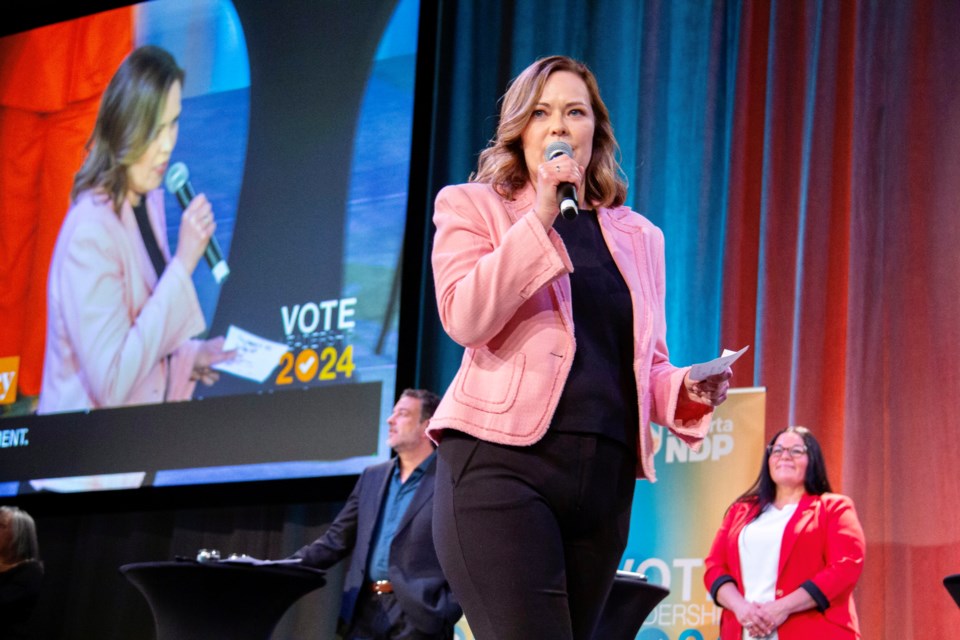CALGARY – Jobs, homes, and health care. Those three topics dominated the discourse during the second NDP leadership debate held May 11 at the BMO Centre in Calgary.
Gil McGowan, Jodi Calahoo Stonehouse, Sarah Hoffman, Kathleen Ganley and Naheed Nenshi spent the afternoon discussing the future of their party, province, and possible premiership in 2027.
“There are two big questions that any leadership candidate should be able to answer: what do you stand for, and how will you win?” said McGowan during the debate.
All five candidates had an equal opportunity to answer that question. Moderators Cheryl Oates and Rishi Nagar gave candidates the chance to give an opening statement, answer a question from the audience, have one-on-one debates with their peers, and finalize their points in a brief concluding statement.
Right from the beginning, candidates laid out why they should be the next leader of the NDP.
Ganley positioned herself as the antithesis of the UCP’s government, with the former NDP cabinet minister jumping right in.
“This UCP government is a horrible government. They don’t care about governing, they don’t care about democracy, and they don’t care about you,” said Ganley.
McGowan, a Westlock County native, said the party needed to appeal to a broader range, pointing out the discrepancy between voters who have a university education and those who don’t.
Calahoo Stonehouse spoke passionately about protecting the province’s waterways and building a better Alberta from the north to the south.
Hoffman pointed to her successful history as a health minister in the province — during her tenure, the Calgary Cancer Centre was constructed, with Hoffman sharing a story of her second day as a minister.
“I will assert that building a brand-new public hospital is the most NDP thing we could have done,” said Hoffman, who added she was “unapologetically NDP.”
Nenshi focused on the broader movement across the party and his role as a party outsider. The leadership race was Nenshi’s first provincial political experience after a career as Calgary’s mayor.
Head to heads
The bulk of the debate occurred in head-to-discussions, where candidates alternated between answering a question and debating their peers. The format meant the candidates had to share the stage, having a minute-and-a-half to debate questions that varied from, “How will you spend the next three years as party leader?” to, “What needs to be done to grow in Calgary?”
The format created an unique dynamic in a modern world where political attacks and personal attacks are often indistinguishable. Calahoo Stonehouse, Ganley, and Hoffman are all sitting MLAs, and as such generally agree on the direction the party needs to go.
Calahoo Stonehouse and Hoffman ended up sharing a microphone after one died midway through their debate, and Ganley used phrases like, “that’s exactly right” during both her debates with her co-workers.
Nenshi and McGowan were a little different, with the two NDP outsiders bringing their own brand of debate to the table.
McGowan’s debate with Hoffman ended with the later exasperatedly throwing her hands in the air while remarking they were meant to share the stage, and an attempt to use Nenshi’s mayoral history against him backfired after Nenshi ran out the clock with his answer.
Nenshi also found himself in a heated debate with Hoffman after she turned a question about maintaining the party's core values while appealing to more Albertans into a pointed question about a mobile home park’s closure during his mayorship.
Unified in opposition
Despite the fact that all five candidates are in direct competition, the group spent more time attacking Danielle Smith’s UCP government than each other.
“We can’t do what the UCP does,” said Ganley. “We can’t use a downturn in the price of oil to sell out our seniors, sell out our kids, and sell out our healthcare. That is the wrong thing to do.”
Candidates also attacked the province's relationship with municipalities and the federal government, with McGowan pointing to his experience negotiating as a labour leader.
“Albertans expect their governments to work, and working means working with other levels of government,” he said. “We are a federation and a federation doesn’t work unless the different levels of government are talking to each other.”
All five candidates will be in Athabasca May 15 for their next event, where they’ll host a meet and greet with rural caucuses. The third and final leadership debate will be held June 2 at the Edmonton Convention Centre, and the next NDP party leader will be announced in Calgary June 22.



